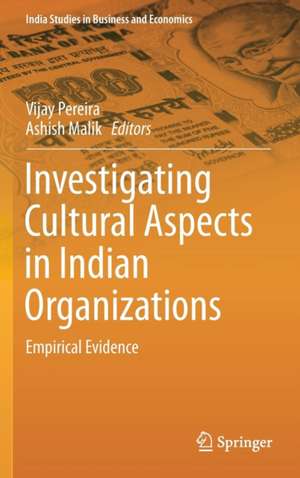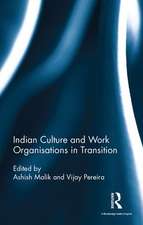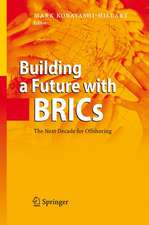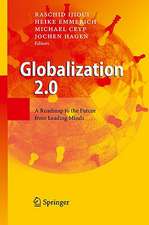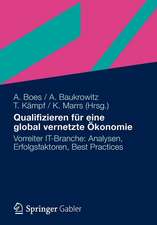Investigating Cultural Aspects in Indian Organizations: Empirical Evidence: India Studies in Business and Economics
Editat de Vijay Pereira, Ashish Maliken Limba Engleză Hardback – 28 apr 2015
The World Bank predicts that in the near future India will become the world’s second largest economy. The recent high growth rates reported by businesses in the Indian economy needs to be sustainable, especially amidst its high cultural diversity. Whilst there is tremendous interest in understanding the intricacies of Indian culture and a growing literature focusing on topics such as India-specific management and internationalization strategies of Indian firms, the cultural aspects of Indian businesses have been largely ignored. This book aims to fill this gap. It covers various topics in organizational culture and management such as human resource management, cross-cultural communication and coaching, cultural similarity, cultural literacy, multiculturalism, generational cultural values, talent acquisition and knowledge management. It also features case studies from high growth sectors such as the IT and health industries.
Presenting contributions from local Indian and international researchers, this book provides a multidimensional perspective that will appeal to students, scholars and practitioners interested in organizational culture and management in India.
| Toate formatele și edițiile | Preț | Express |
|---|---|---|
| Paperback (1) | 383.71 lei 43-57 zile | |
| Springer International Publishing – 6 oct 2016 | 383.71 lei 43-57 zile | |
| Hardback (1) | 391.02 lei 43-57 zile | |
| Springer International Publishing – 28 apr 2015 | 391.02 lei 43-57 zile |
Din seria India Studies in Business and Economics
- 18%
 Preț: 734.27 lei
Preț: 734.27 lei -
 Preț: 361.77 lei
Preț: 361.77 lei - 18%
 Preț: 1006.24 lei
Preț: 1006.24 lei - 18%
 Preț: 952.89 lei
Preț: 952.89 lei - 20%
 Preț: 883.20 lei
Preț: 883.20 lei -
 Preț: 186.41 lei
Preț: 186.41 lei - 15%
 Preț: 636.94 lei
Preț: 636.94 lei - 15%
 Preț: 647.27 lei
Preț: 647.27 lei - 15%
 Preț: 646.30 lei
Preț: 646.30 lei -
 Preț: 409.89 lei
Preț: 409.89 lei -
 Preț: 372.98 lei
Preț: 372.98 lei -
 Preț: 389.88 lei
Preț: 389.88 lei - 18%
 Preț: 894.03 lei
Preț: 894.03 lei - 15%
 Preț: 644.30 lei
Preț: 644.30 lei - 15%
 Preț: 528.30 lei
Preț: 528.30 lei - 15%
 Preț: 643.65 lei
Preț: 643.65 lei - 15%
 Preț: 644.82 lei
Preț: 644.82 lei - 15%
 Preț: 660.37 lei
Preț: 660.37 lei -
 Preț: 386.00 lei
Preț: 386.00 lei - 20%
 Preț: 559.74 lei
Preț: 559.74 lei - 15%
 Preț: 643.99 lei
Preț: 643.99 lei -
 Preț: 386.68 lei
Preț: 386.68 lei -
 Preț: 390.08 lei
Preț: 390.08 lei -
 Preț: 365.76 lei
Preț: 365.76 lei -
 Preț: 393.52 lei
Preț: 393.52 lei - 15%
 Preț: 656.74 lei
Preț: 656.74 lei - 24%
 Preț: 699.22 lei
Preț: 699.22 lei -
 Preț: 369.80 lei
Preț: 369.80 lei - 15%
 Preț: 642.68 lei
Preț: 642.68 lei -
 Preț: 388.90 lei
Preț: 388.90 lei - 15%
 Preț: 649.87 lei
Preț: 649.87 lei - 15%
 Preț: 645.28 lei
Preț: 645.28 lei -
 Preț: 372.66 lei
Preț: 372.66 lei -
 Preț: 389.17 lei
Preț: 389.17 lei - 20%
 Preț: 569.00 lei
Preț: 569.00 lei - 15%
 Preț: 641.85 lei
Preț: 641.85 lei -
 Preț: 392.97 lei
Preț: 392.97 lei - 15%
 Preț: 643.84 lei
Preț: 643.84 lei - 24%
 Preț: 656.29 lei
Preț: 656.29 lei - 15%
 Preț: 651.34 lei
Preț: 651.34 lei - 15%
 Preț: 641.53 lei
Preț: 641.53 lei - 15%
 Preț: 640.37 lei
Preț: 640.37 lei - 20%
 Preț: 569.85 lei
Preț: 569.85 lei
Preț: 391.02 lei
Nou
Puncte Express: 587
Preț estimativ în valută:
74.82€ • 78.32$ • 62.28£
74.82€ • 78.32$ • 62.28£
Carte tipărită la comandă
Livrare economică 31 martie-14 aprilie
Preluare comenzi: 021 569.72.76
Specificații
ISBN-13: 9783319160979
ISBN-10: 3319160974
Pagini: 204
Ilustrații: XII, 204 p. 9 illus., 5 illus. in color.
Dimensiuni: 155 x 235 x 18 mm
Greutate: 0.49 kg
Ediția:2015
Editura: Springer International Publishing
Colecția Springer
Seria India Studies in Business and Economics
Locul publicării:Cham, Switzerland
ISBN-10: 3319160974
Pagini: 204
Ilustrații: XII, 204 p. 9 illus., 5 illus. in color.
Dimensiuni: 155 x 235 x 18 mm
Greutate: 0.49 kg
Ediția:2015
Editura: Springer International Publishing
Colecția Springer
Seria India Studies in Business and Economics
Locul publicării:Cham, Switzerland
Public țintă
ResearchCuprins
Chapter 1 Culture in Indian Organisations.- Chapter 2 The role of religion on human resource management (HRM) practices in India.- Chapter 3 Zippies and the Shift in Cultural Values in India.- Chapter 4 The Cultural Similarity Paradox.- Chapter 5 A cross-cultural approach in coaching as viewed through the guru-śiṣya paradigm.- Chapter 6 An empirical study of the influence of culture on talent acquisition and relationship with organisational global ambitions in Indian organisations.- Chapter 7 Impact of Knowledge Management Practices on Competitive Advantage.- Chapter 8 A Study on Organisational Culture in Indian Private Hospitals.- Chapter 9 The Changing Face of Indian Organizations.- Chapter 10 Organizations and Indian Culture: A Multicultural Perspective.- Chapter 11 Culture research in India: Critical issues and future research opportunities.
Notă biografică
Dr. Vijay Pereira, PhD, is a Senior Lecturer of International and Strategic HRM and holds the position of Leader in Knowledge Services (Human Capital Development) in the Organisation Studies and HRM group at the Portsmouth Business School, University of Portsmouth, UK. He holds six academic qualifications, and has published in several leading journals such as HRM, the Journal of World Business, International Studies of Management & Organization, Culture & Organisation, International Journal of Indian Culture & Business Administration, etc. He has also contributed to several book chapters and is currently co-editing three books. He is the Area/Associate Editor (OB/HRM) of the Journal of Asia Business Studies (JABS). He is also guest editing three special issues, including one on Indian Culture in the Journal Culture and Organization. His previous experiences have been in consulting and industry, both in India and the UK.
Dr. Ashish Malik, PhD is a lecturer in the ER&HRM group at the University of Newcastle, Australia. Ashish completed his PhD from Victoria University of Wellington, New Zealand and holds a MA (PM&IR) from the Tata Institute of Social Sciences, India. Ashish's thesis examined skills and capability development issues in the Indian IT industry. Ashish has published and presented more than 40 research papers with an India focus at numerous national and international conferences. His works have appeared in numerous academic journals including the Asia-Pacific Business Review and Industrial Marketing Management. Ashish is currently co-editing two books (with Routledge and Springer) on business models in the Indian IT industry and culture, respectively, and co-authoring another book on Human capital management in the Indian IT/BPO sector with Palgrave Macmillan. Ashish is also co-editing three journal special issues focusing on employment relations in India, Indian culture and National Business Systems in Asian countries for the International Journal of Employment Studies, Culture & Organisation and Journal of Asia Business Studies journals. Ashish currently serves on the editorial board of Journal of Asia Business Studies and Jindal Journal of Business Research (Sage Publishing).
Dr. Ashish Malik, PhD is a lecturer in the ER&HRM group at the University of Newcastle, Australia. Ashish completed his PhD from Victoria University of Wellington, New Zealand and holds a MA (PM&IR) from the Tata Institute of Social Sciences, India. Ashish's thesis examined skills and capability development issues in the Indian IT industry. Ashish has published and presented more than 40 research papers with an India focus at numerous national and international conferences. His works have appeared in numerous academic journals including the Asia-Pacific Business Review and Industrial Marketing Management. Ashish is currently co-editing two books (with Routledge and Springer) on business models in the Indian IT industry and culture, respectively, and co-authoring another book on Human capital management in the Indian IT/BPO sector with Palgrave Macmillan. Ashish is also co-editing three journal special issues focusing on employment relations in India, Indian culture and National Business Systems in Asian countries for the International Journal of Employment Studies, Culture & Organisation and Journal of Asia Business Studies journals. Ashish currently serves on the editorial board of Journal of Asia Business Studies and Jindal Journal of Business Research (Sage Publishing).
Textul de pe ultima copertă
The purpose of this edited collection is to analyze the cultural aspects of Indian organizations. As the world’s largest and most diverse democracy, Indian society can be best described as an amalgam of multiple cultures, value systems, socio-political and institutional orientations. This book offers a theoretical and empirical basis for understanding the evolving and changing nature of these aspects in Indian organizations.
The World Bank predicts that in the near future India will become the world’s second largest economy. The recent high growth rates reported by businesses in the Indian economy needs to be sustainable, especially amidst its high cultural diversity. Whilst there is tremendous interest in understanding the intricacies of Indian culture and a growing literature focusing on topics such as India-specific management and internationalization strategies of Indian firms, the cultural aspects of Indian businesses have been largely ignored. This book aims to fill this gap. It covers various topics in organizational culture and management such as human resource management, cross-cultural communication and coaching, cultural similarity, cultural literacy, multiculturalism, generational cultural values, talent acquisition and knowledge management. It also features case studies from high growth sectors such as the IT and health industries.
Presenting contributions from local Indian and international researchers, this book provides a multidimensional perspective that will appeal to students, scholars and practitioners interested in organizational culture and management in India.
The World Bank predicts that in the near future India will become the world’s second largest economy. The recent high growth rates reported by businesses in the Indian economy needs to be sustainable, especially amidst its high cultural diversity. Whilst there is tremendous interest in understanding the intricacies of Indian culture and a growing literature focusing on topics such as India-specific management and internationalization strategies of Indian firms, the cultural aspects of Indian businesses have been largely ignored. This book aims to fill this gap. It covers various topics in organizational culture and management such as human resource management, cross-cultural communication and coaching, cultural similarity, cultural literacy, multiculturalism, generational cultural values, talent acquisition and knowledge management. It also features case studies from high growth sectors such as the IT and health industries.
Presenting contributions from local Indian and international researchers, this book provides a multidimensional perspective that will appeal to students, scholars and practitioners interested in organizational culture and management in India.
Caracteristici
Broadens understanding of Indian culture in organizations? Covers topics such as human resource management, knowledge management, multiculturalism and cultural literacy Provides a theoretical and empirical basis for understanding culture in Indian organizations
